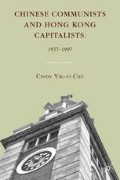Abstract
Although the united front effort had limitations, the Chinese Communists were successful in soliciting the support of big business in the years preceding 1997 in preparation for the handover. Beijing did not hesitate to announce those who were its staunch supporters and those whom it considered troublemakers. The ultimate objective was to ensure the smooth transfer of the administration of Hong Kong in 1997. In forming the Preliminary Work Committee (PWC) and appointing the Hong Kong Affairs Advisers and District Affairs Advisers, the Chinese Communists created a three-tier united front to consolidate their position regarding the future leadership of the Hong Kong SAR. Thus, the united front work of this period was more restricted than the effort made in the 1980s, as Beijing did not select members of the United Democrats of Hong Kong, who had opposing opinions and were critical of the Communist strategy. In contrast to earlier times, the Chinese Communists openly declared the enemy of the united front—the last governor of Hong Kong, Christopher (Chris) Patten.
Access this chapter
Tax calculation will be finalised at checkout
Purchases are for personal use only
Preview
Unable to display preview. Download preview PDF.
Notes
John Flowerdew, The Final Years of British Hong Kong: The Discourse of Colonial Withdrawal (Houndmills: Macmillan, 1998), pp. 66–67.
Sze-yuen Chung, Hong Kong’s Journey to Reunification: Memoirs of Sze-yuen Chung (Hong Kong: Chinese University Press, 2001), p. 172.
Alvin Y. So and Reginald Y. Kwok, “Socioeconomic Center, Political Periphery: Hong Kong’s Uncertain Transition Toward the Twenty-first Century,” in The Hong Kong Reader: Passage to Chinese Sovereignty, ed. Ming K. Chan and Gerard A. Postiglione (Armonk, NY: M. E. Sharpe, 1996), p. 213.
Lau Siu-kai, “From Elite Unity to Disunity: Political Elite in Post-1997 Hong Kong,” in Hong Kong in China: The Challenges of Transition, ed. Wang Gungwu and John Wong (Singapore: Times Academic Press, 1999), pp. 56–57.
Geoffrey Crothall, “China’s Leaders Greet ‘Friends,’” South China Morning Post, March 12, 1992, p. 5.
Kent Chen and Geoffrey Crothall, “Reforms Emphasised in Speech to Advisers,” South China Morning Post, March 13, 1992, p. 6.
Frank Ching, “The Beijing Bosses Look for the Right Kind of Advice,’” South China Morning Post, January 31, 1992, p. 17.
Copyright information
© 2010 Cindy Yik-yi Chu
About this chapter
Cite this chapter
Chu, C.Yy. (2010). The Chinese Communists’ United Front with Big Business and Their Collaboration on the Handover, 1990–1997. In: Chinese Communists and Hong Kong Capitalists: 1937–1997. Palgrave Macmillan, New York. https://doi.org/10.1057/9780230113916_6
Download citation
DOI: https://doi.org/10.1057/9780230113916_6
Publisher Name: Palgrave Macmillan, New York
Print ISBN: 978-1-349-29085-7
Online ISBN: 978-0-230-11391-6
eBook Packages: Palgrave Political & Intern. Studies CollectionPolitical Science and International Studies (R0)

